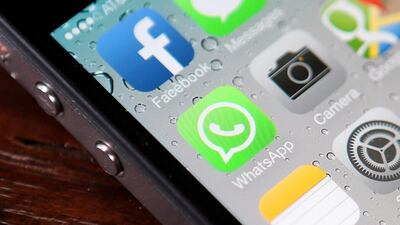Facebook has agreed to buy the mobile-messaging start-up WhatsApp for US$19 billion in cash and stock, in a deal that underscores the popularity of instant messaging and the social media giant's determination to broaden its platform and move into mobile applications.
The acquisition is the biggest tech tie-up in more than a decade since Time Warner merged with AOL in a $124bn deal in 2001. Facebook agreed to pay WhatsApp $4bn in cash, $12bn in stocks and $3bn in restricted shares.
WhatsApp, which allows users to send free instant messages between phones that have different operating systems, has 450 million users and is adding 1 million users a day. It is expected in time to reach 1 billion users, making it the first application other than Facebook to achieve this.
Meanwhile, user growth at Facebook has slowed as younger surfers shun a platform that their parents now use. Facebook acquired the photo-sharing application Instagram for $700 million in 2012.
WhatsApp eschews advertising, focusing rather on user experience. Under the agreement, WhatsApp will continue to operate independently from Facebook and be ad free. This has raised questions about whether the deal offers Facebook shareholders good value.
WhatsApp is free for the first year, then users must pay 99 cents annually for the service. Even with 1 billion users, it will take decades to recoup the investment. Facebooks shares dropped as much as 5.8 per cent in extended trading after the deal was announced on Wednesday, but recovered to end the day 1.1 per cent higher at $68.06. They were trading at $66.60 at 5.20pm on Thursday in Abu Dhabi.
“There is a bigger issue here more than the fact of return on investment because Facebook will have a suite of social media products,” said Paul Black, the director of telecoms and media for the Middle East, Turkey and Africa at the market intelligence firm IDC. “So if you are using WhatsApp, then are you maybe predominantly inclined to now go to Instagram to share your photos and from Instagram onto Facebook and so on.”
Mayank Garg, the regional head of content at media agency MediaCom, said that the deal, which follows the Japanese online retailer Rakuten’s acquisition of the competing Viber messaging application, will probably catalyse more such mergers.
“The biggest players are going to try to go in and snap up messaging companies – the ones that are really growing,” Mr Garg said.
Kakao, the most popular messaging application in South Korea, is preparing a public share sale that may see it valued at $1bn, the Wall Street Journal reported yesterday.
Mr Garg also pointed out that because WhatsApp is linked to the user’s phone, Facebook will now has access to telephone numbers, which can generate “a lot of useful insight”, he said.
lgutcher@thenational.ae

